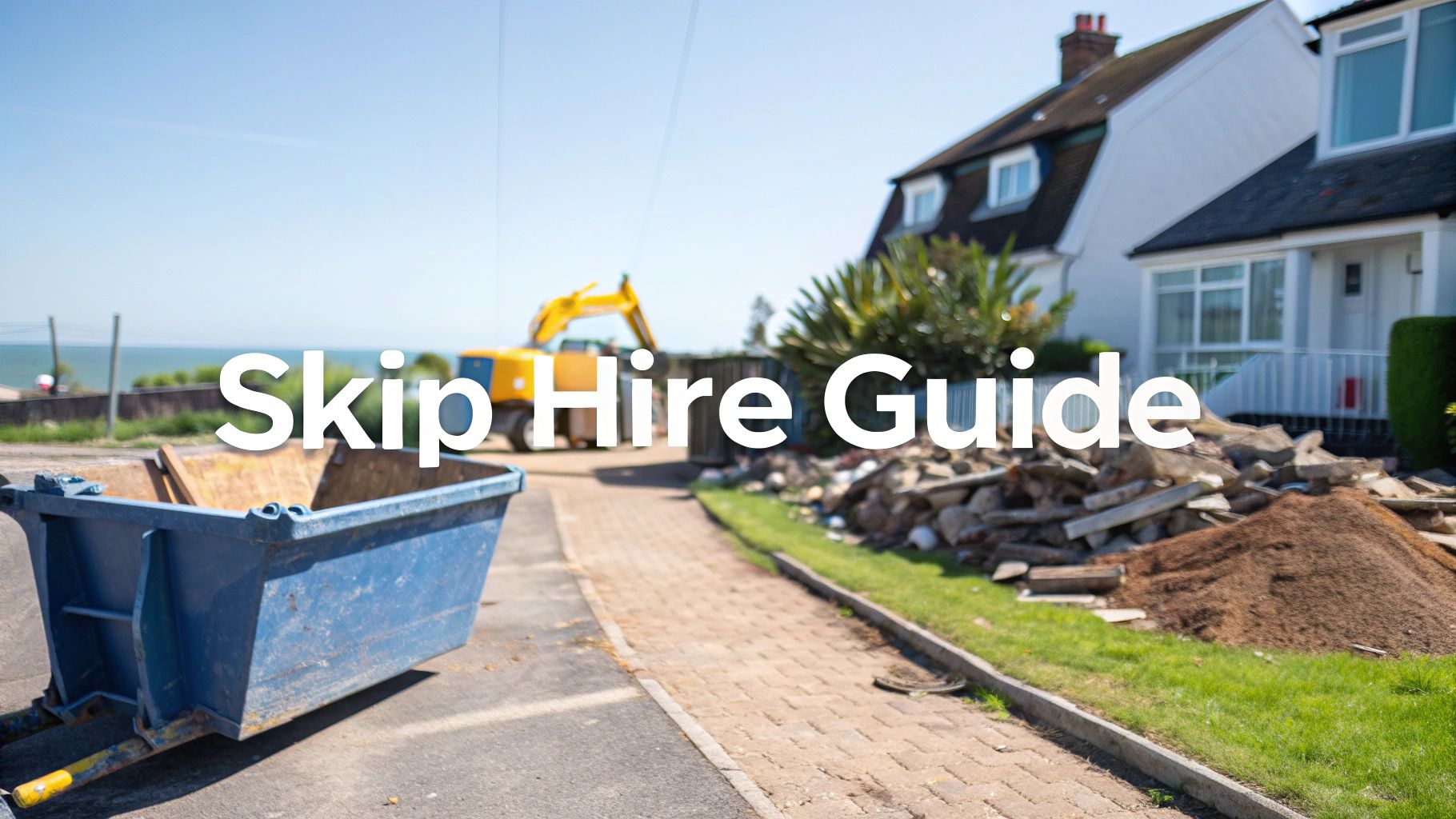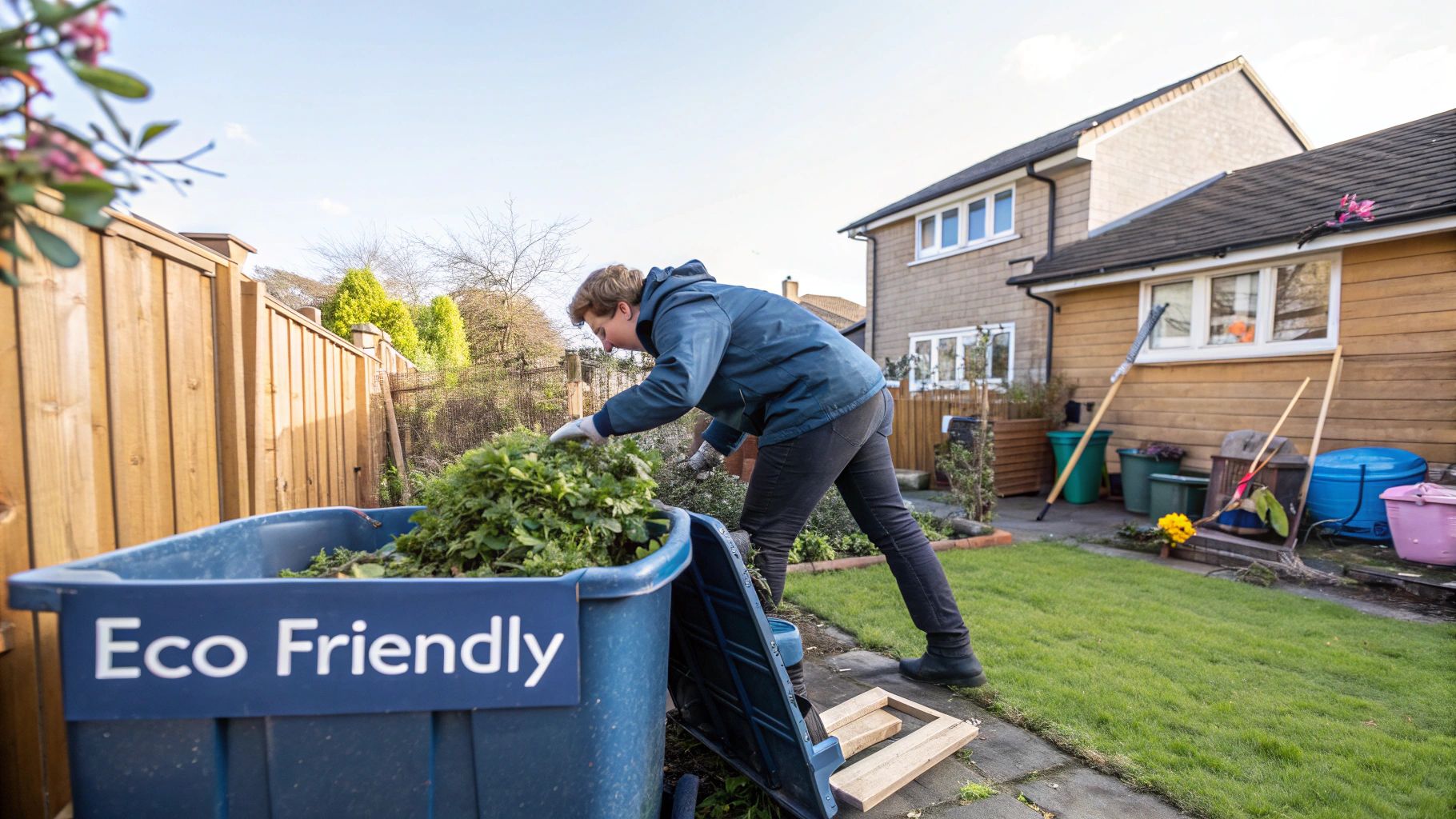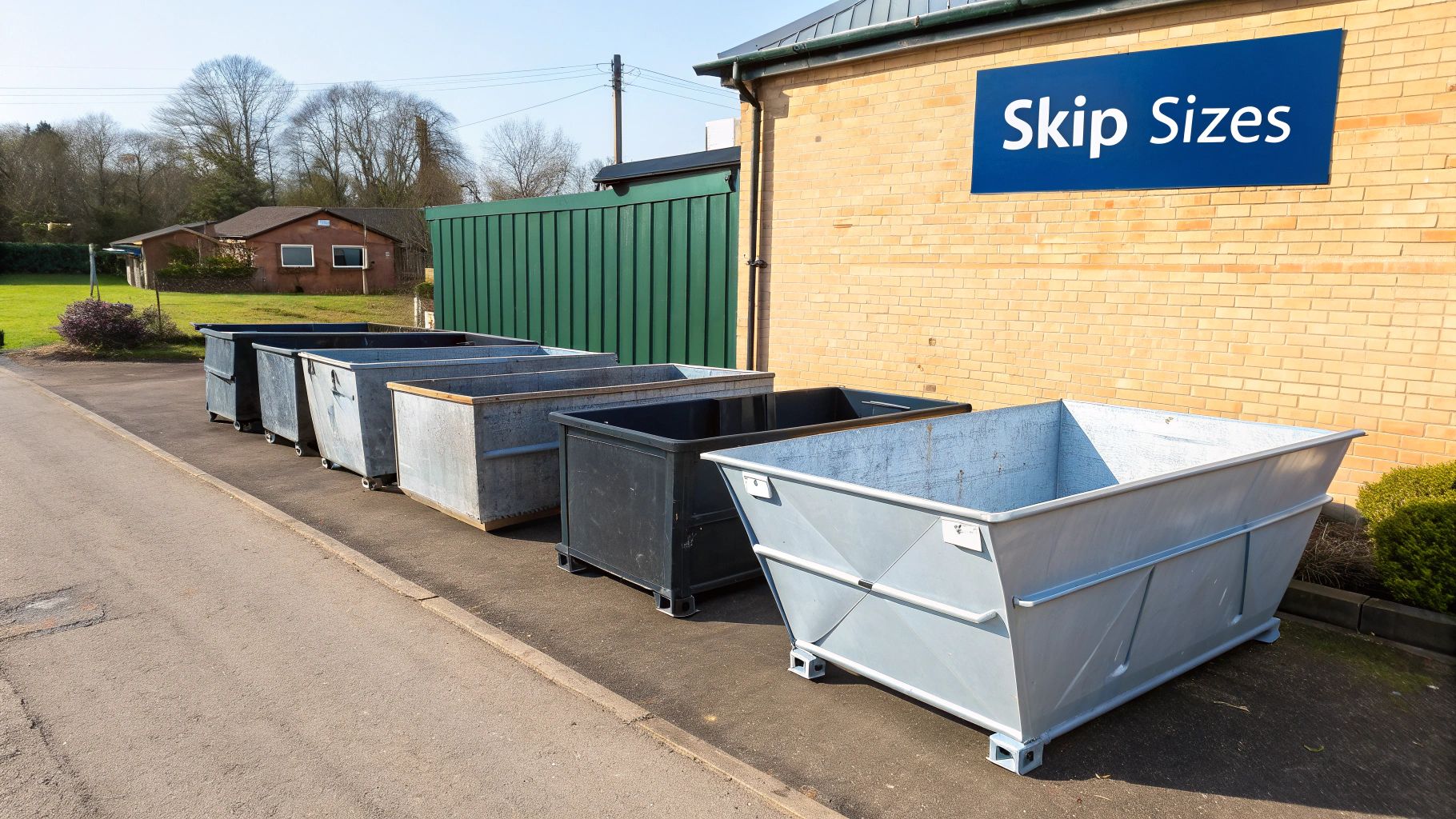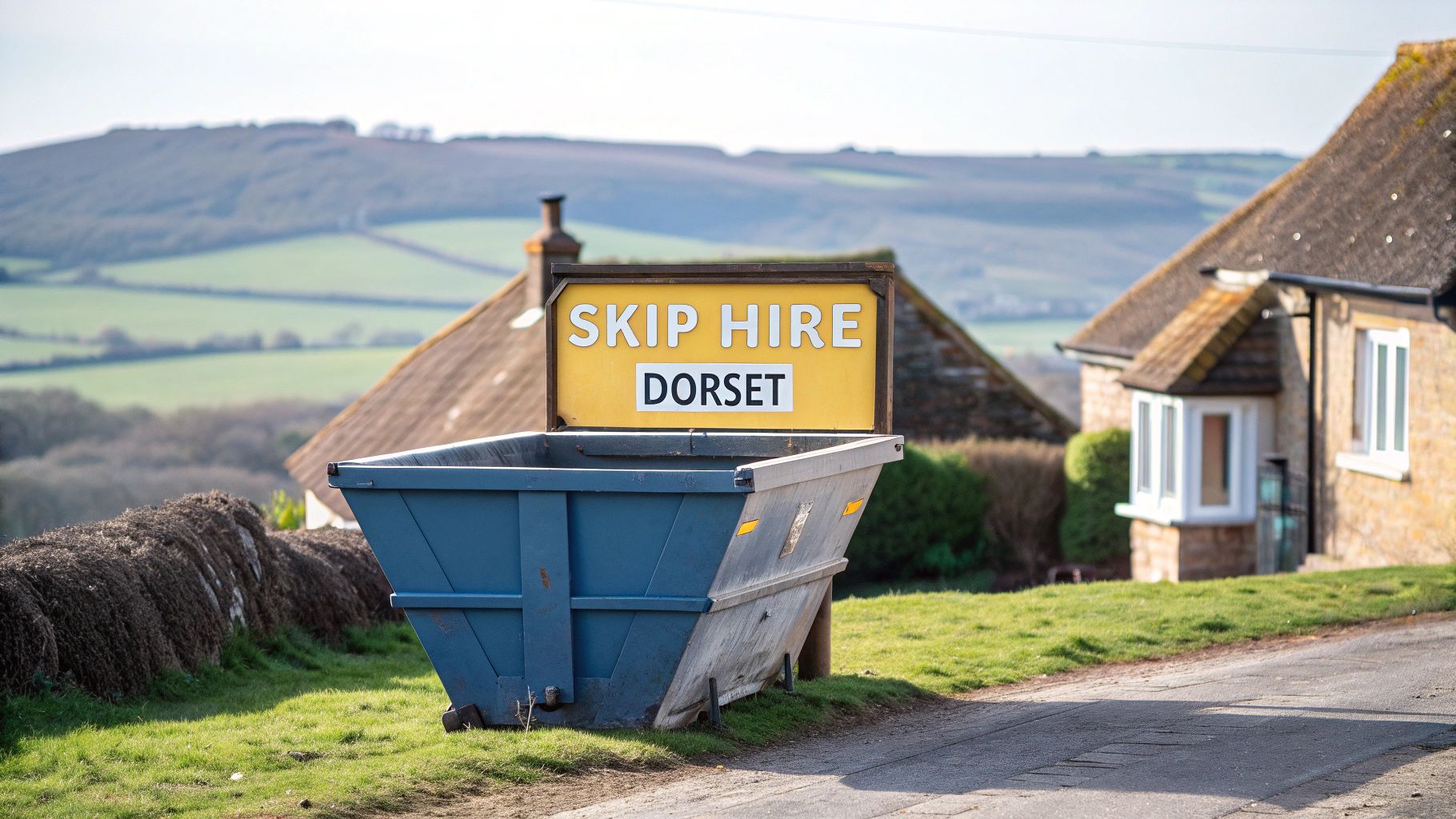Skip Hire in Poole Dorset Your Essential Project Guide

Skip Hire in Poole Dorset Your Essential Project Guide
Before you even think about booking a skip, you need to get a clear picture of what your project actually involves. It’s a classic mistake: you either guess and end up with a skip that's overflowing halfway through the job, or you pay for a huge one and only fill it halfway. A little bit of planning upfront is the key to getting your skip hire in Poole Dorset right from the start.
Matching Your Project to the Right Skip Hire Service
The kind of waste you're getting rid of, and how much of it there'll be, are the two biggest factors. A weekend garden clear-out in Canford Cliffs is a completely different beast to a full-blown kitchen renovation in Parkstone. The best way to start is to mentally walk through the job and make a realistic estimate of the debris you'll be creating.
It really helps to break down the different types of waste. For more involved jobs like demolition projects, you absolutely have to know what you’re dealing with to dispose of it correctly. Any decent skip hire company in Poole will ask you about this anyway, so being prepared helps them give you the right advice and the right skip.
Common Waste Types for Poole Projects
To get you started, here’s a quick rundown of the usual suspects when it comes to waste:
- General Household Waste: This is all the stuff from a house clearance – think old sofas, unwanted toys, clothes, and general non-electrical clutter.
- Green Waste: Perfect for garden jobs. This covers everything from grass clippings and branches to soil and leaves.
- Inert Waste: This is the heavy-duty stuff from building work. We’re talking bricks, concrete, rubble, tiles, and soil. It's incredibly heavy, so it often needs a specific type of skip.
Knowing the difference helps you have a clear conversation with your skip provider. It means you’ll stay on the right side of the rules and avoid any nasty surprises or extra fees for mixing up your waste. Honestly, getting this part right lays the foundation for a smooth hire.
Key Takeaway: Accurately identifying your waste type—be it garden, household, or construction debris—is the single most important step. It dictates the skip size, cost, and disposal method, preventing logistical headaches down the line.
What Is Strictly Off-Limits
Just as important as knowing what can go in is knowing what can't. Trying to sneak prohibited items into a general skip is a recipe for disaster. You could be hit with hefty extra charges, or they might just refuse to collect it altogether. Some materials are genuinely hazardous and need specialist disposal.
Here’s a list of things you can't just chuck in a mixed-waste skip:
- Asbestos
- Plasterboard (this usually needs its own dedicated skip)
- Batteries
- Fridges and freezers
- Tyres
- Paint tins and solvents
- Electrical items (WEEE)
If you're dealing with any of these, you have to let your waste management company know. They can sort out the correct, safe disposal and keep your project fully compliant with environmental regulations. A quick chat about it at the beginning will save you a world of pain later on.
Choosing the Perfect Skip Size in Poole
Picking the right skip size for your project in Poole can feel a bit like guesswork. But getting it right is the single biggest thing you can do to keep your budget in check and your project running smoothly.
Get one that’s too small, and you're stuck with the hassle and extra cost of hiring a second one. Go too big, and you’re literally paying for empty space. The trick is to find that sweet spot for the job you've got on your hands.
The hardest part is often just picturing how much waste you'll actually have. Here’s a little tip I always give people: try to estimate it in standard black bin bags. It’s a simple way to turn a messy pile of garden clippings or old bathroom tiles into a volume you can actually work with.
Matching Skips to Common Poole Projects
The next step is connecting the skip size, which is measured in cubic yards, to a real-world job. A small garden clear-out in your Broadstone home is going to need something very different from a big shop refurbishment down by Poole Quay.
Here's a quick look at the most common sizes and what they're typically used for.
Common Skip Sizes and Their Ideal Uses in Poole
To make it even easier to visualise, this table breaks down the most popular skip sizes we see hired out across Poole and the surrounding areas.
| Skip Size (Cubic Yards) | Approximate Capacity (Bin Bags) | Ideal For (Example Projects) |
|---|---|---|
| 2-4 Yard 'Mini' | 20-40 | Weekend garden tidy-ups, small DIY jobs, clearing out a shed. |
| 4-6 Yard 'Midi' | 40-60 | Small kitchen or bathroom refits, larger garden clearances. |
| 6-8 Yard 'Builder's' | 60-80 | Major home renovations, extensions, bulky construction waste. |
As you can see, the jump in capacity is pretty significant between sizes, which is why a little bit of planning goes a long way.
If you’re still scratching your head, we’ve put together a more detailed guide to help you out. Take a look at our advice on what size skip you might need to get a really clear picture.
Hiring a skip in Poole is dead simple once you know what you're doing. This infographic runs through the whole process, from that first decision to the final collection.

It all starts with getting that initial size estimate right. From there, booking and collection just fall into place.
What About Bigger Jobs?
For those massive commercial projects or huge site clearances, your standard builder's skip just isn't going to cut it. This is where the big guns come in: roll-on/roll-off (RORO) containers. They’re absolutely essential for handling large volumes of waste from big construction sites.
From the most compact mini skips for home projects to enormous 50-yard industrial containers, local providers have every scenario covered.
My best piece of advice? If in doubt, go a size up. It is always, always cheaper to have a little extra room left over than it is to pay for a second skip to be delivered. That’s a mistake you only make once
Understanding Skip Permits and Placement Rules
Figuring out where your skip will live during the project is just as important as choosing the right size. It’s a classic oversight that can lead to unexpected delays and even hefty fines if you get it wrong.
The rules are actually quite straightforward once you know what’s what. It all boils down to one simple question: will the skip be on your private land, or on public property?
If you have a driveway, a front garden, or any other private patch of land with enough room, you're golden. Placing a skip on your own property in Poole is by far the easiest route. You don’t need to worry about permits, which saves you both time and money. The only thing to check is that the skip lorry has clear access to drop off and collect it without any drama.
When a Skip Permit Becomes Necessary
Things get a little more formal the moment your skip needs to go on public land. We’re talking about any part of a public road, pavement, or even a grass verge. For any skip hire in Poole Dorset that involves placing it on a public highway, you absolutely must have a skip permit from the local authority, which is the BCP Council.
This isn't something to take a chance on. The council needs to be sure the skip won't obstruct traffic, block a neighbour's access, or create a hazard for pedestrians and cyclists.
The good news? You almost never have to handle this bit of admin yourself. Any reputable skip hire company will be registered with the council and will manage the entire permit application for you. They know exactly what information is needed and will simply add the permit cost to your final bill.
Expert Tip: Always ask your chosen company if they will arrange the permit. A proper professional firm sees this as a standard part of the service, taking a significant headache off your to-do list.
This screenshot from the BCP Council website shows the official portal they use for these applications.

It just goes to show that this is a formal process handled directly with the local authority, reinforcing why it’s so important to use a registered and compliant skip hire provider.
Safety and Compliance on Public Roads
When a skip is sitting on a public road, it comes with a set of non-negotiable safety responsibilities. Your hire company will make sure the skip is correctly positioned and meets all the legal requirements.
These typically include:
- High-Visibility Markings: The skip must have reflective markings so it's easily seen by drivers, especially after dark.
- Safety Lights: It should be fitted with lights or lamps that are switched on during the hours of darkness.
- Traffic Cones: Cones are usually placed around the skip to help guide traffic safely past it.
Getting this wrong can result in fines for both you and the hire company. It’s a bit like how larger jobs, such as tree felling, often require specific council approval for removal projects. In every case, following the official rules is the only way to make sure your project goes smoothly and without any legal trouble.
Remember, the permit process takes time—often several working days. You have to factor this into your project timeline. Never assume you can get a skip delivered to a public road the very next day. Plan ahead and have a chat about your placement needs with the hire company when you first book.
The Booking and Delivery Process from Start to Finish

You’ve figured out the right size skip and tackled the permit question. Now for the easy part: getting it booked and delivered. The process itself is usually dead simple, but a little bit of prep will make sure it goes off without a hitch.
When you call up or book online, the company will ask for a few key details to get your skip hire in poole dorset sorted. Having this information ready beforehand means you'll get a quick, accurate quote and a delivery slot that suits you perfectly.
Information You Will Need
Before you dial, it pays to have these details jotted down:
- Full Delivery Address: Make sure to include the postcode. If your house is tucked away or hard to find, give some clear directions.
- Contact Information: A name and a mobile number are crucial. The driver might need to give you a quick call on delivery day.
- Skip Size: Let them know if you've settled on a mini, midi, or one of the larger builder's skips.
- Waste Type: Be as specific as you can. Is it general clutter from the house, green waste from a garden overhaul, or heavy stuff like bricks and soil?
- Placement Location: Confirm where it's going – on a private driveway or on the public road (which is where the permit they arrange comes in).
- Preferred Dates: Have an ideal delivery day in mind, and a rough idea of how long you'll need the skip for.
Getting this info together first makes the booking process a breeze. If you're looking for more local specifics, you can dig deeper into the various Poole skip hire options to see what fits your project.
Preparing for the Skip Delivery
A bit of forward-thinking before the skip lorry arrives can make all the difference. Your main job is to ensure the driver has a clear, safe path to drop the skip exactly where you want it.
First things first, completely clear the spot where the skip will sit. That means shifting cars, garden pots, bikes, or anything else that could be in the way. These lorries are big, and they need a decent amount of room to manoeuvre.
Pro Tip: If your skip is going onto a block-paved or tarmac drive, I always recommend putting down a few old wooden planks or scaffold boards first. This simple trick helps spread the weight and protects your driveway from getting scuffed or damaged by the heavy metal base.
Being there on the day to meet the driver is also a great idea. You can guide them to the perfect position, making sure it’s easy to load up later without blocking access to your garage or front door. A few minutes of planning here saves a lot of hassle down the line.
How to Dispose of Waste Responsibly in Poole
Hiring a skip is a fantastic way to clear out waste from a project, but your job isn’t done the moment it lands on your drive. How you fill that skip and the company you choose for your skip hire in poole dorset genuinely matters, not just for your wallet but for our local environment.
Getting it right is more than just side-stepping extra charges. It's about doing your bit to keep our corner of Dorset clean and ensuring your waste is handled legally and ethically from start to finish.
Loading Your Skip the Smart Way
There’s a real knack to loading a skip properly. If you just start chucking things in willy-nilly, you’ll end up paying for a skip full of air pockets. A little bit of strategy, on the other hand, means you can fit in far more than you’d think.
Start with the big, flat items – think old doors, sheets of wood, or panels. Get them lying flat on the bottom to create a solid base. Next, get to work breaking down anything bulky like cabinets or tables. Once that's done, start adding the heavy stuff like soil and rubble, followed by the lighter, more awkward-shaped objects. As you go, use all the smaller bits and pieces to fill in any gaps.
Crucial Tip: Whatever you do, don't overfill the skip. The waste must stay below the 'level load' line painted on the side. An overfilled skip is a danger on the road, and the driver is well within their rights to refuse to collect it, leaving you to deal with the messy job of emptying the excess.
This isn't just some arbitrary company rule; it's a legal requirement for transporting waste safely on UK roads.
The Hidden Dangers in Your Waste
It's absolutely vital to know what you can't put into a mixed waste skip. Some items are classed as hazardous and need specialist disposal to prevent them from harming the environment or creating a safety risk. A classic example is the battery from an old toy or TV remote – if that gets crushed at a waste facility, it can easily start a major fire.
Be on the lookout for these common culprits:
- Batteries: Always take them out of electronics before you get rid of them.
- Electricals (WEEE): Anything with a plug or a battery needs to be recycled separately.
- Plasterboard: This can't be mixed in with your general waste due to its chemical makeup.
- Fridges & Freezers: They contain hazardous gases and need a professional to degas them safely.
- Paint Tins & Solvents: These are considered hazardous chemical waste and need to be handled separately.
To be on the safe side, it’s always smart to double-check what you’re throwing out. You can learn more about prohibited items in our detailed guide to make sure you're not caught out.
Choosing a Licensed Carrier Fights Fly-Tipping
Your choice of skip hire company is probably the most important decision you'll make in this whole process. You’ll see plenty of "man with a van" types offering unbelievably cheap quotes, but there's often a sinister reason for the low price: they illegally dump your waste in local beauty spots to dodge proper disposal fees. If that waste gets traced back to you, you could be facing a hefty fine.
Fly-tipping is a huge problem locally. In the year ending March 2024, the BCP Council had to deal with a staggering 2,792 fly-tipping incidents across Bournemouth, Christchurch, and Poole – the second-highest figure in five years. You can read more about the local fly-tipping statistics and their impact to see the scale of the issue.
Always, always use a reputable company that holds a valid Waste Carrier Licence. When they collect your skip, they should provide you with a Waste Transfer Note. This document is your legal proof that your waste has been passed on to a licensed carrier for correct disposal. It’s your safety net. Any professional firm will also have a strong commitment to recycling, making sure as little of your waste as possible ends up in a landfill.
Your Poole Skip Hire Questions Answered

Even with the best-laid plans, a few questions always seem to surface right before you’re ready to book your skip hire in Poole Dorset. Getting those final details ironed out is key to making sure your project runs smoothly, without any last-minute surprises.
We get it. That's why we've put together answers to the most common queries we hear from residents and businesses across Poole. Think of this as the final checklist to give you total confidence before you pick up the phone.
How Much Does It Cost to Hire a Skip in Poole?
There's no single price tag for hiring a skip in Poole. The final cost really depends on a few moving parts: the size of the skip you need, how long you'll need it for, and whether it's going on a public road (which means you'll need a permit).
To give you a ballpark idea, here’s what you might expect:
- A small 'mini' skip (around 2-4 yards) often starts from £100-£150.
- A standard 'builder's' skip (the popular 6-8 yarders) usually lands between £250-£350.
Don't forget, if you need a permit from BCP Council, that will add an extra fee to the total. The smartest move is always to ring a couple of trusted local companies for quotes to see who offers the best value for your specific job.
What Can I Not Put in a Skip in Dorset?
This is probably the most important rule to get right. Standard skips are for general waste, and there's a strict list of items you simply can't throw in. Putting prohibited items in your skip can mean the company refuses to collect it, or you could face some hefty extra charges.
Important Reminder: You are legally responsible for the waste you dispose of. Prohibited items often contain hazardous materials that require specialist handling to prevent fires, pollution, and harm to waste management staff.
You'll need to find a specialist disposal route for the following:
- Asbestos and plasterboard (unless you've specifically hired a plasterboard-only skip)
- Tyres, fridges, and freezers
- Batteries of any kind – they're a serious fire risk at recycling facilities
- Paint tins, solvents, and other liquid chemicals
- Electrical items (often called WEEE waste), like TVs, microwaves, or even old kids' toys with batteries in them
How Long Can I Keep the Skip For?
Most skip hire companies in the Poole area work on a standard hire period of 7 to 14 days. For the majority of garden clear-outs, home renovations, or decluttering jobs, this is usually more than enough time.
But things don't always go to plan. If you get the job done quicker than expected, a quick call is usually all it takes to arrange an early collection. Need it for longer? Most firms are flexible and can extend the hire, though this might come with an extra charge. Just remember, if your skip is on the road, its stay is dictated by your council permit's expiry date.
Do I Need to Be Home for Delivery and Collection?
It’s always a good idea to be there when the skip arrives. Being on-site means you can have a quick chat with the driver and point out exactly where you want it. This helps avoid any accidental damage to your drive or lawn and makes sure it's in the perfect spot for easy loading.
For the collection, it’s less critical. As long as the lorry can get to the skip easily and you haven't overfilled it (no rubbish sticking out over the top!), the team can usually just get on with it. It’s always worth double-checking the specifics with your hire company when you book.
For a reliable, straightforward, and environmentally conscious skip hire in poole dorset, look no further than The Waste Group. We offer a complete range of waste solutions tailored to your project's needs. https://www.thewastegroup.co.uk

